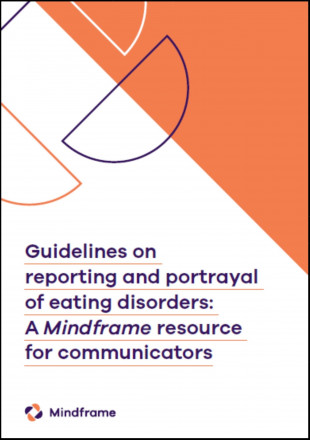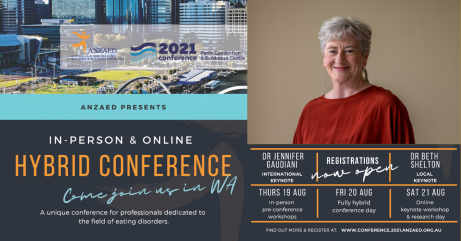Issue 75: New resources
About this resource
NEDC revised and updated Fact Sheets
Consumer Checklist – Interview with Tracey Wade
Editor’s Note:
As part of the NEDC’s role in laying the foundations for a national stepped system of care, evidence-based resources form the building blocks of knowledge and action. Breaking down stigma, increasing literacy, and understanding the importance of early intervention are crucial in improving outcomes for people with lived experience of eating disorders.
In this issue NEDC updates you about new resources and innovations. This includes our own updated fact sheets on the different types of eating disorders and new resources for carers and supports; an innovative consumer checklist created by Australian eating disorder experts to help people locate suitable clinicians; and updated guidelines for media professionals for best-practice reporting and portrayal of eating disorders.
You can read about NEDC’s resource rollout here and access resources here, including the new fact sheets:
a new booklet:
Caring For Someone With an Eating Disorder
and new infographic:
Seven Tips for Families and Supports
It can be difficult for people living with an eating disorder, their family and supports to locate a suitable clinician, or even to know the questions they need to ask: Is a therapist accredited or registered? Are they able to provide Medicare-rebated sessions? Are they the right person for me? What therapies do they offer? Is it the right therapy for me? How many sessions will I need? Will my family be involved? What happens if there is a crisis?
Treatment and recovery can take a long time and asking the right questions at the beginning can help ensure people with lived experience of an eating disorder can work effectively with their health professionals for a better outcome. Eating disorder experts Professor Tracey Wade and Professor Phillipa Hay, lived experience advocates Belinda Caldwell (Eating Disorders Victoria CEO), Shannon Calvert, Tanya Kretschmann, and Elise Thompson, and researcher and clinical psychologist Deborah Mitchison, have developed a checklist designed to empower consumers to locate evidence-based treatment earlier, and to help make it easier to connect people with professionals. We interviewed Prof. Wade to find out more about this useful innovation. Read it here.
In this issue, there is also an update on recent MBS changes and a re-cap of the ANZAED Conference.
NEDC Resource rollout
Any person, at any stage of their life, can experience an eating disorder. More than one million Australians are currently living with an eating disorder, yet many people have little knowledge or understanding of eating disorders, the various types, risk factors, warning signs or consequences. Being diagnosed with an eating disorder, or supporting a person with lived experience of an eating disorder, can be the beginning of a long and difficult journey, and finding access to up-to-date information can help illuminate the way ahead.
NEDC’s newly revised resources have been designed for people living with an eating disorder and their family and supports to better understand eating disorders and the experience of living with an eating disorder, across diagnostic presentations. They are also a helpful tool for clinicians and health practitioners to provide their clients and patients to increase literacy and awareness of eating disorders.
Fact sheets are aligned with the Diagnostic and Statistical Manual of Mental Disorders (DSM-5), and experts in the eating disorders field including clinicians, people with lived experience, academics, and researchers have been consulted to ensure our resources are accurate, inclusive, and easy to understand. All are available in downloadable PDF form and are freely accessible on our website.
Our fact sheets contain clear definitions, list risk factors, physical, psychological and behavioural warning signs, medical and psychological impacts and complications, and the latest evidence-based treatment options. They also provide advice about recovery, explain what people can do and where they can go for help, and are fully referenced.
Beginning with eating disorder types, we have updated our anorexia nervosa, binge eating disorder, bulimia nervosa and other specified feeding and eating disorders (OSFED) fact sheets. We have introduced a new fact sheet on avoidant/restrictive food intake disorder (ARFID), which clearly and concisely explains what ARFID is, its characteristics and complications, and how it differs from other eating disorders. It also lists physical, psychological and behavioural warning signs, medical and psychological impacts and complications and treatment options.
We have revised our disordered eating and dieting fact sheet to provide explanation of the dangers of dieting and the diet cycle. This can also be read alongside the body image fact sheet.
NEDC resources for carers and supports have also been updated, with a revised Caring for Someone with an Eating Disorder booklet and infographic Seven Tips for Families and Supports now available. The infographic highlights seven tips for families and supports, while the booklet includes these tips in addition to providing a model to promote understanding of the stages of change – from pre-contemplation, contemplation, preparation, action and maintenance and termination – along with practical advice and links to support services.
We will keep you informed online and on social media as new resources become available. Follow us on Facebook, Twitter, Instagram and LinkedIn.
Consumer Checklist – Interview with Tracey Wade
Getting treatment for an eating disorder can be a long and difficult process, especially when people have little knowledge of eating disorder treatment and don't know where to start or what questions to ask.
We spoke to Tracey Wade to find out more about a new Consumer checklist that can help make it easier for people to navigate the treatment-seeking journey.
How did you become involved in eating disorders?
I first became interested in eating disorders when I was on placement in the counselling service at the Australian National University. One of my supervisors suggested we could advertise a group for people living with eating disorders, something the counselling service had not previously done, and see what sort of response we received. The response was overwhelming, we had to run two groups! I remember sitting through that, as a young woman, marvelling that all these lovely, bright, personable women uniformly felt that they were completely worthless and needed to control their weight and shape to feel acceptable. My next job was working with Cambridge University students who had eating disorders who experienced exactly the same beliefs. From there I became passionately committed to working in this area.
Your research has covered genetics, COVID-19, media literacy, and you espouse a ”three-pronged” approach encompassing research/evidence, clinician expertise and consumer preference. How have you implemented your experience and research into real-world settings as resources that may help people with lived experience of body image issues and eating disorders?
I am incredibly fortunate to be able to work as a clinician and researcher and so when I come across questions I can’t answer as a clinician, I can try to answer them through my research with my colleagues and asking people with lived experience what they think. This has resulted in the collaborative development of an evidence-based self-help book on perfectionism as well as a manualised shorter form of cognitive behaviour therapy for non-underweight eating disorders (which seems as effective as longer treatments).
Navigating the eating disorders system can be very difficult, particularly for a newly diagnosed person. The relationship between a person with an eating disorder and the health professionals working with them is fundamental to the success of treatment. How did you decide to create the Consumer Checklist resource? Can you tell us about the process, getting the team together, and deciding on the 15 questions. How would you recommend this checklist be used? Do you have any other advice for people hoping to find the “right” health professional for their needs?
The idea of the checklist came to me when I was flying over to Sydney (ah yes, they were the days) to the official announcement of the Medicare items at Butterfly House. Flying used to be my best time for thinking (now it is the shower) and I suddenly realised a lot of practitioners might be saying that they could treat people with eating disorders when they really had no experience or suitable supervision. The NEDC and ANZAED have been doing fantastic work to address this with credentialing, but I thought it would be good to help work with the consumer to empower them to ask the right questions in order to find the right practitioner. So I contacted people I thought could help – people with lived experience (Belinda Caldwell, Shannon Calvert, Tanya Kretschmann, Elise Thompson) and some of my favourite researcher-clinicians (Deborah Mitchison, Phillipa Hay) – we had a couple of brainstorming sessions over Zoom to decide the 15 questions, which were informed by evidence and consumer preference. I can see two ways of using the checklist. The first was suggested by Chris Thornton, who was training clinicians and getting them to think about if they could answer these questions and how. So, it has a role in training. The second is, of course, to get consumers thinking about what to expect from therapy. Third, these are questions that many may not feel comfortable to use in interviewing their potential therapist, but they may feel it is appropriate to ask some of the questions so they can know what to expect and are better able to work with their therapist as a team. In terms of finding that “right” health professional, it is not about finding someone that agrees with you but who challenges you to be the best you can – but respectfully, and when things don’t feel right, the checklist may help you identify where the problem is, to discuss it with your therapist, and to either sort it out or move on to someone who can offer the treatment you need for recovery.
Over your career, you have focused on the links between perfectionism and eating disorders (including the book, “Overcoming Perfectionism”, and several studies and journal articles ranging from Perfectionism as a transdiagnostic process: A clinical review (2011) to Perfectionism interventions targeting disordered eating: A systematic review and meta-analysis (2021). The Blackbird Research Initiative recently released the free online Focused Minds Program resource. The trial is the first phase of a three-year study aimed at Australians aged 17-25 years who wish to work on setting realistic, achievable standards or who struggle with basing their self-worth on their achievements. Can you tell us about this program?
The program is based on the content of our book, which has been evaluated across many intervention studies now and found to decrease both perfectionism and disordered eating. My PhD student Kasia Robinson has done a courageous job of wrestling the content into 8 modules onto an online format that we think is engaging and relevant to youth. My colleague Sarah Egan and her PhD student Chloe Shu did a similar piece of work for adolescents and found it substantially decreased disordered eating in people who identified as being perfectionistic. We will offer this to people with disordered eating specifically, who struggle with relying too much on achievement of harsh black or white goals to define their worth. It forms another pathway to reducing disordered eating without necessarily dealing directly with the eating. As we say in our book, perfectionism can be the root of disordered eating, as well as depression and anxiety, and changing that can have wide-ranging impacts in people’s lives.
The evidence-practice divide can be difficult to bridge. Your recent study Comparative efficacy and acceptability of psychological interventions for the treatment of adult outpatients with anorexia nervosa: a systematic review and network meta-analysis (2021) found that: “Compared with treatment as usual, specific psychological treatments for adult outpatients with anorexia nervosa can be associated with modest improvements in terms of clinical course and quality of life, but no reliable evidence supports clear superiority or inferiority of the specific treatments that are recommended by clinical guidelines internationally.” How important is research in determining the effectiveness of current evidence-based treatments and what can we learn from this?
In the eating disorder field, I think we are at the stage of needing to really take a long reflective look at our progress using the research we have. I believe we have made progress in the treatment of anorexia nervosa, and have identified some core “good practice” approaches that should be included in any outpatient therapy (such as weekly sessions, weighing at each session and sharing this information collaboratively, psychoeducation, involvement of significant others wherever possible, nutritional advice including regular eating, and use of specialist psychotherapists). More expensive randomized controlled trials are not the way forward at the moment (in my opinion), but more nimble research that can lead to some sizeable progress, such as greater utilization of adaptive designs and understanding which specific components are responsible for impact, how they work and which patient characteristics this works best with.
Another recent article, Tertiary eating disorder services: is it time to integrate specialty care across the life span? (2021), examines Australian eating disorder services’ current model of care, which is split between child and adolescent mental health services (CAMHS) which support patients until the age of 18 years, and adult mental health services (AMHS). What would like you to see replace this model, based on your years of research?
This answer is based on research but also consumers’ experience and preferences – I would love to see the “age-split” model abolished as being nonsensical for eating disorders which often emerge over the time that people are required to change from adolescent to adult services. I suggest it be replaced with an integrated model, such as the one in Dorset (United Kingdom), which integrates child and adolescent and adult services into one unit, under one governance. In this way any change between therapists is dictated not by age but by readiness. It is a challenging issue, with no easy answers, but one we need to grapple with if we wish to change our services for what is best with people with eating disorders and their families.

Matthew Flinders Distinguished Professor Tracey Wade has worked as a clinician and researcher in eating disorders for over 30 years. In 2015 she was elected a Fellow of the Academy of the Social Sciences in Australia. In 2016 she was made an Inaugural Honorary Fellow of the Australian Association for Cognitive and Behaviour Therapy. In 2017-18 she was the president of the Eating Disorder Research Society. In 2019 she was appointed Fellow of the APS and was a recipient of the Australia and New Zealand Academy of Eating Disorders Distinguished Achievement Award, and in 2020 she was the recipient of the Academy of Eating Disorders Outstanding Clinician Award. She is the director of the Órama Institute for Mental Health and Wellbeing, the Blackbird Initiative, and the Flinders University Services for Eating Disorders (FUSED). She has cowritten three books and has over 240 publications in peer-reviewed journals.
New Mindframe reporting guidelines
Eating disorders are often misunderstood in the community, resulting in inaccurate reporting, stereotyping, and the use of language and images with a potentially harmful impact.
In collaboration with Mindframe, Butterfly, and Australian media professionals, NEDC has developed and updated the Mindframe Guidelines on reporting and portrayal of eating disorders, an evidence-based resource which provides practical advice for journalists, editors, and other media professionals to support best-practice reporting and portrayal of eating disorders. The guidelines aim to increase responsible, accurate, and sensitive representations of eating disorders in the media and to reduce stigma.
The Mindframe Guide to the Reporting and Portrayal of Eating Disorders provides tips for reporting, up-to-date facts about eating disorders, evidence on the link between media and eating disorders, and guidance on how to appropriately present information about eating disorders on media platforms.
Some of the areas addressed include:
- Accurate portrayal of eating disorders as serious mental illnesses
- Appropriate language and use of images
- Avoiding detail of specific behaviours or measurements
- Inclusion of up-to-date facts and data
Although this resource is targeted at media professionals, key messages can help guide teachers, government representatives, non-government organisations and those in the education, health, sport, fitness, and other relevant sectors to communicate appropriately about eating disorders using evidence-based guidelines.
Access the Mindframe Guidelines on reporting and portrayal of eating disorders here.
You can read more about Media Guidelines on our website here and the importance of Media Literacy here.
About Mindframe
Mindframe is a national program supporting safe media reporting, portrayal and communication about suicide, mental ill-health and alcohol and other drugs. Mindframe is managed by Everymind and is funded by the Australian Government’s Department of Health under the National Suicide Prevention Leadership and Support Program.
It is informed by evidence and expert advisors, and provides national leadership and support on how to apply best practice principles for safe communication and media coverage about suicide, mental ill-health, alcohol and other drugs to media students, news media and public relations organisations, media sources and creators of fictional portrayals.
To encourage help-seeking behaviour, Mindframe developed national guidelines for the discussion, reporting and publication of content that references mental health or mental ill-health.
For more information, visit the Mindframe website.
Medicare changes
MBS changes to COVID-19 Temporary MBS Telehealth Services were introduced in July 2021.
NEDC has produced a MBS changes fact sheet containing information about the new, continuing and discontinued telephone items from 1 July 2021, which may be relevant to GPs and other medical practitioners providing services via telephone to patients experiencing an eating disorder.
No changes to face-to-face items or telehealth items delivered via videoconference have been made.
The full list of items (face-to-face, telehealth and telephone) available from 1 July 2021 for GPs and other medical practitioners is available here.
MBS-produced fact sheets for other provider groups are available here.
ANZAED Conference
A thought-provoking, diverse and inspiring 19th Annual ANZAED Hybrid Conference - From Ripples to Rivers: How Far We've Come - was held from 19-21 August 2021 in Perth and online. The program was wide-ranging and reflected contemporary issues concerning the eating disorders sector. Stimulating in-depth discussions were held over the three days covering weight stigma, trauma-informed care, impacts of social media, the impact of COVID-19 and the increased use of telehealth, the importance of the lived experience voice in clinical practice and research, and many more topics of interest. The informative sessions encouraged optimism for the future, with several ground-breaking endeavours and initiatives outlined in presentations from Australian eating disorder organisations, academics, clinicians, lived experience professionals and university research teams.
The NEDC team played an important role, with National Director Dr Beth Shelton giving a keynote address If the System Could Talk: A Brief Autobiography of the Eating Disorders Field in Australia. Past, Present, and Future. Clearly illustrated by animation mapping the development of services nationally since the 1980s, the talk charted the sector’s growth from ’a handful to hundreds’ of services. Dr Shelton demonstrated how change takes time, determination and clear strategy, and put forward a plan for the future of the system of care. The key message remains: eating disorders aren't an optional extra in health care, they should be core business.
Dr Shelton also co-chaired the Credentialing Luncheon Meeting with outgoing ANZAED President Dr Kim Hurst, answering questions about the ANZAED Eating Disorder Credential, including supervision and training opportunities. Find out more here.
NEDC Project Manager Louise Dougherty introduced the new Eating Disorders Quality Improvement Tool (ED-QI) for Primary Health Networks. The innovative tool will assist PHNs to identify, prioritise, and plan service improvements. Find out more here.
NEDC Research Lead Dr Angelique Ralph, Professor Phillipa Hay, lived experience advocate Jo Farmer, and Guideline Development Group members led a workshop to seek feedback on the draft NEDC Clinical practice guidelines for the treatment of eating disorders for people living in larger bodies. Valuable input was provided by workshop participants. There are a number of further consultation stages to occur before the final Guidelines are released. Information on these consultations will be provided and feedback sought from NEDC members. The guidelines will provide a path for improvement in treatment. Stay tuned for an opportunity to provide feedback.
International keynote speaker Dr Jennifer Gaudiani gave an enlightening keynote encompassing weight stigma, provider privilege, and the importance of not perpetuating diet culture. She concluded that weight-inclusive care – psychologically, nutritionally and medically – should be the way forward. This was backed up by her formidable three-hour Q&A masterclass, which covered medical management of complex presentations, weighing, fertility, HAES resources, and internalized stigma among physicians. She noted that for clinicians, curiosity and compassion are crucial, with relationships the core of eating disorder recovery. Her masterclass ended with a reminder about the importance of boundaries in avoiding burnout, and a call to action: the eating disorder sector needs you now, and long-term, to continue this transformative work.
Conference delegates can access recordings of many sessions here.




